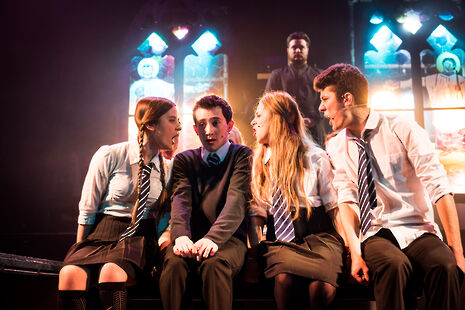BARE
Rebecca Vaa is deeply impressed by this challenging pop opera

Bare: a pop opera is a difficult musical to get just right, challenging both vocally and musically, as well as addressing very heavy, pressing issues of self-identity, acceptance, sexuality and faith. However, director Sarah Mercer managed to capture all of its levels and facets, playing on both its humour and its confrontation of very serious societal conflicts, and imparting equal care to produce both great acting and sublime singing. All in all, a beautiful final show of her career as director of musicals on the Cambridge theatre scene.
The musical centres around the secret relationship of two young boys, Peter and Jason, preparing to graduate from their senior year at a Catholic boarding school. Peter, tired of hiding and uncertainty about his own identity, wishes to break free of the chains of this daunting secret, whereas Jason, facing strong internal conflicts about who is, who he wishes he was, and who everyone else expects him to be, is terrified of what telling the truth will mean. Joe Pitts and Ed Limb cast as the two leading men gave stunning performances, displaying strong chemistry and tender intimacy. Pitts stunned the audience with his touching song Role of a Lifetime, and the dynamic of the pair really shone in the duet Bare. Lucy Dickson, portraying the role of Nadia, Jason’s sister, was one of the true stars of the night. Capturing her character and all of her insecurities beautifully, Dickson perfected the mix between humour and sincerity, bringing quirkiness and fun into the mix of a very sombre show. Simultaneously, her rendition of Quiet Night at Home was breathtaking, revealing the vulnerability lurking behind the strong façade of Nadia.
The production as a whole was beautifully crafted. Vocally, harmonies were spot on and electrifying. Choreography was playful, without becoming tacky and dominating. The set was designed simplistically, with the gorgeous stained-glass windows hanging above every scene, setting the atmosphere of the oppressive environment hanging over the heads of the boys, influencing their every move. At times, the tempo and flow of the plot was slowed by reflective, narrative solos, but each of these added to the development of different characters. The only significant flaw with the production as a whole was its difficulties with microphones and sound, which sadly distracted from the show and the wonderful music. This was a real shame, but the actors handled it well and maintained the energy throughout the show in spite of these technical challenges.
Production aside, the story itself is incredibly moving, bringing to light the anxieties and hardships of finding yourself and accepting yourself in a world that is quick to judge, especially when religion and faith make up so much of who you are. All Cambridge theatre goers should definitely catch this masterpiece before it’s too late.
 News / Cambridge academics stand out in King’s 2026 Honours List2 January 2026
News / Cambridge academics stand out in King’s 2026 Honours List2 January 2026 Interviews / You don’t need to peak at Cambridge, says Robin Harding31 December 2025
Interviews / You don’t need to peak at Cambridge, says Robin Harding31 December 2025 Comment / What happened to men at Cambridge?31 December 2025
Comment / What happened to men at Cambridge?31 December 2025 News / Varsity’s biggest stories of 202531 December 2025
News / Varsity’s biggest stories of 202531 December 2025 Features / “It’s a momentary expression of rage”: reforming democracy from Cambridge4 January 2026
Features / “It’s a momentary expression of rage”: reforming democracy from Cambridge4 January 2026









